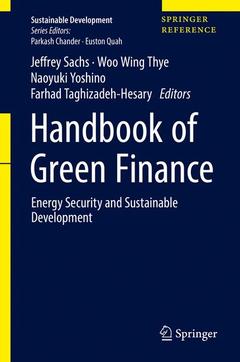Handbook of Green Finance, 1st ed. 2019 Energy Security and Sustainable Development Sustainable Development Series

Introduction (All authors, Yoshino to lead).- Financing the SDGs.- Development and climate finance.- Structure and goal of the book.- Local economic development of Asian countries (Former Director General, Environmental Agency, Kyoto University).- Trends and current states of green finance.- Issues and barriers in furthering private investment into green energy.- Overview of financing needs in Asia.- New development agenda and roles of development cooperation (Professor Jeffrey Sachs).- The 2030 Agenda and the SDGs.- Macroeconomic and finance challenges for climate change .- Potential roles of development cooperation ^Yoshino).- The background of HIT concept.- Financing for environmental improvements by HIT.- Generalizing HIT: Designing effective development and climate finance for local communities (Dr. Kim).- Innovative finance for local economic development.- Development finance make “risky” business proposal profitable: ‘Hometown investment trust fund’ with climate finance.- Implementing the new finance approach.- Climate Financing of Green Technologies in the European Union (M. Helble).- 8, Pension funds and Insurance for Green finance.- 9, Public Private Partnership for Green finance (ADB).- 10, Viability Gap Funding for Green Finance.- Conclusion.
Jeffrey Sachs serves as Director of the Center for Sustainable Development at Columbia University. He is University Professor at Columbia University, the university’s highest academic rank. During 2002 to 2016 he served as the Director of the Earth Institute. Sachs is Special Advisor to United Nations Secretary-General António Guterres on the Sustainable Development Goals, and previously advised UN Secretary-General Ban Ki-moon on both the Sustainable Development Goals and Millennium Development Goals and UN Secretary-General Kofi Annan on the Millennium Development Goals. Sachs is currently Director of the UN Sustainable Development Solutions Network under the auspices of UN Secretary-General António Guterres, and a Commissioner of the ITU/UNESCO Broadband Commission for Development. He is Chair and Founder of SDG USA, a non-governmental initiative to promote the Sustainable Development Goal concepts in the United States. Sachs is also co-founder and ChiefStrategist of Millennium Promise Alliance, and was director of the Millennium Villages Project (2005-2015).
Wing Thye Woo is Professor of Economics at University of California in Davis, and Director of Jeffrey Sachs Center on Sustainable Development at Sunway University in Kuala Lumpur. He also holds academic appointments at Fudan University in Shanghai, Columbia University in New York City, Penang Institute in George Town, and Chinese Academy of Social Sciences in Beijing. He is an expert on the East Asian economies, particularly, China, Indonesia and Malaysia. His current research focuses on designing efficient, equitable pathways to achieving the Sustainable Development Goals with projects on Green Finance, Middle Income Trap, and Global Economic Architecture for the Multi-Polar World. He has been convener of the Asian Economic Panel (AEP) since 2001, a forum of specialists on Asian economies which meets tri-annually to discuss important Asian economic issuesand
Date de parution : 07-2019
Ouvrage de 718 p.
15.5x23.5 cm



